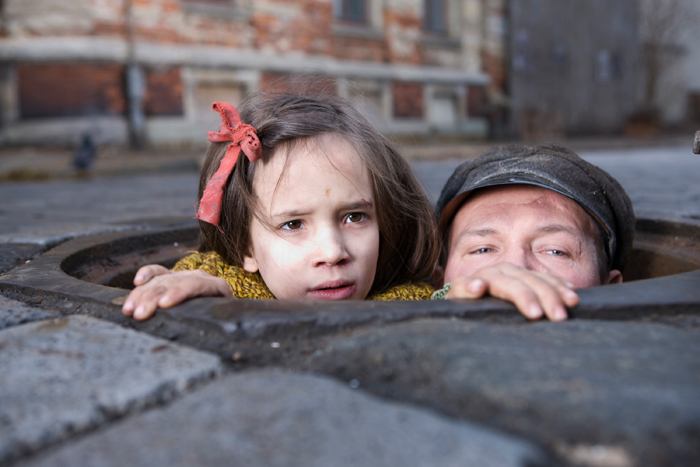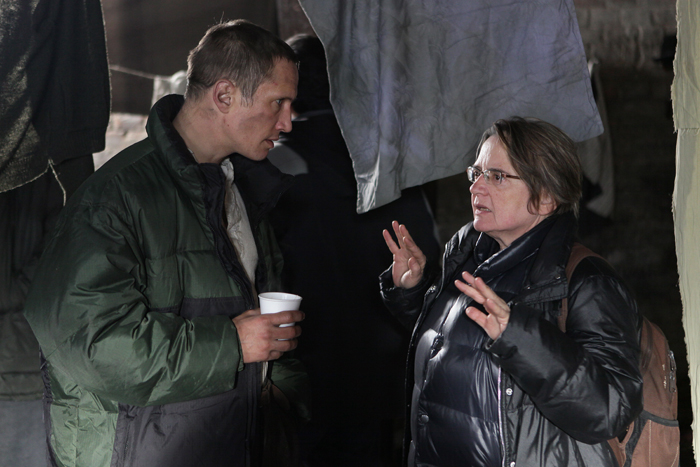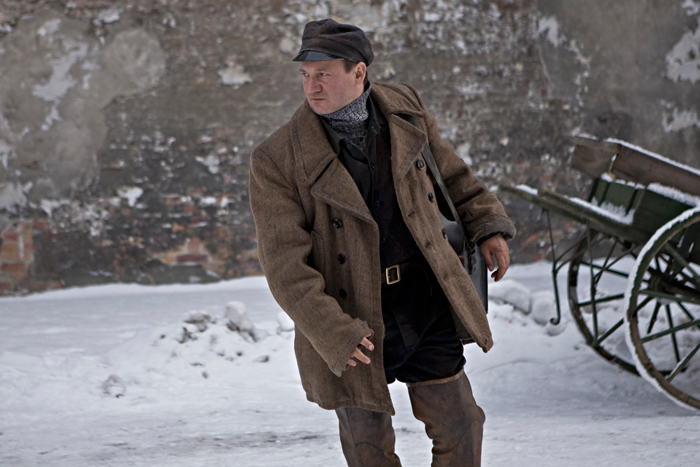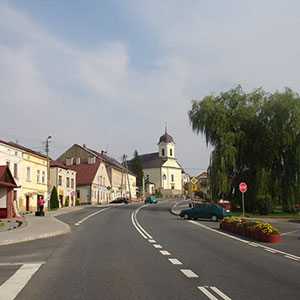
Left to right: Krystyna (Milla Bankowicz) and Leopold Socha (Robert Wieckiewicz)
Photo by Jasmin Marla Dichant, Courtesy of Sony Pictures Classics
In Darkness
Directed by Agnieszka Holland
Canada/Germany/Poland; 2011
Starring Robert Wieckiewicz, Benno Furmann, Agnieszka Grochowska, Maria Schrader, & Herbert Knaup
From the very beginning Agnieszka Holland’s In Darkness – a powerful and intensely moving film that leaves you wondering about the very essence of human morality – evokes the presence of Marek Edelman. The film is not only dedicated to Edelman – the legendary leader of the 1943 armed Jewish revolt against the Nazis in the Warsaw Ghetto – but its piercingly human scenes evoke the passages of Edelman’s book: “And there was love, too, in the ghetto…”
When I interviewed Agnieszka Holland for CR, I asked her about the film’s dedication.
“Marek Edelman was important for me, very close,” she said. “We have been friends in spite of the difference of generations. He always very much wanted me and Andrzej Wajda to make a film about love in the ghetto. We promised him to participate in such a movie if it ever became available.”
And this is what she did.
In Darkness is a Polish-German-Canadian co-production. The script was written by a Canadian, David Shamoon, and was based on a British book by Robert Marshall, “In the Sewers of Lvov.” As the scriptwriter recalls, it all started from a sentence he read in a Toronto newspaper: “A Polish Catholic thief hid a group of Jews in the sewers of Lvov, which he knew well because that was where he hid his loot and actually got a job as a sewer worker.” This one galvanizing sentence led Shamoon to Marshall’s book and the ensuing research made him write the script which – after insisting that it should be realized in the languages original to the story – Agnieszka Holland agreed to film.

Agnieszka Holland directing Benno Furman
Photo by Robert Palka/Fotos-Art
The story In Darkness tells is a straightforward one. In 1943, during the liquidation of the Lwów ghetto a group of Jewish escapees hides in the city’s sewers. They come to the attention of Leopold Socha, a Polish maintenance worker/petty thief who agrees, for a hefty price, to help them. The film chronicles this exchange of money for life, a transaction that becomes more and more perilous and complicated, and in the end transforms everyone involved. Socha knows that if his dealings with the hiding Jews are discovered, the Nazis will kill him, his wife, his daughter, and anyone suspected in aiding him. For months he has to provide the refugees with food, warn them of impending inspections, cover for them when his superiors insist on checking the abandoned corridors. All these actions carry enormous risk. Shop keepers are suspicious of his bulk food purchases, his Ukrainian prison buddy turned a unit commander is stepping on his heels, sniffing at what he considers Socha’s increasingly dubious behaviour.
The Jewish escapees also have their own transactions to conduct. Not all refugees from the ghetto who hid in the sewers can be saved; choices have to be made who will be accepted into the select group Socha will protect and who will be left behind and perish. The chosen ones have their array of problems. They have to survive 14 months in darkness and filth. They face fear, depression, disloyalty of their fellow escapees and the pressure of their own, increasingly fraught emotions. A betrayed wife refuses to go into the sewers with her husband’s lover forcing her husband to chose whom he wants to save: a lover or a wife and child. A sister escapes the relative safety of the filthy sewers, leaving her sibling to face guilt over memories of their childhood rivalry and bitter quarrels.

Leopold Socha (Robert Wieckiewicz)
Photo by Jasmin Marla Dichant
No one in this film is spotless. Heroism is reluctant, almost accidental, achieved in spite of human flaws. And the price of survival keeps growing. A mother smothers a newborn baby whose cries might betray the group. When Socha and Mundek, the leader of the hiding Jews, kill a German soldier who is about to arrest them, his death is avenged by a public execution of 50 Poles. There are class barriers to overcome, there is distrust on both sides. There are prejudices. As Leopold Socha has to shed his anti-Semitism, those he helps have to shed their prejudice towards a lower class Pole whose collaboration they have bought knowing all along that the price for any miscalculation is death. Most of the film takes place in the sewers, the underbelly of the city; the tunnels provide hiding places, but they also exert a hefty price for survival. This is the underworld, the place where humanity is severely tested, where characters are forged. To most Polish viewers the sewers also evoke the memory of the Warsaw underground tunnels, the last means of escape for the fighters of the Warsaw 1944 Uprising, and its filmic representation, Kanał the epic film by Holland’s mentor Andrzej Wajda. This is an allusion the director is fully aware of and which she is adamant to explore.
To quote Agnieszka Holland again: “The biggest and the most exciting challenge for me as a filmmaker was the darkness. They live in the dark, stink, wet and isolation for over a year. We knew we had to express it, to explore this underground world in a very special, realistic, human and intimate way. We wanted the audience to have the sensual feeling of being there. And to maintain tension as the viewer slowly becomes attached to the story. The dynamic of the film is built on inter-cutting the worlds of the two leads, Socha and Mundek. These two worlds come together to be one, in which they must work together to survive.“
It all comes together in this deeply humane drama: the unflinching honesty of the filming, the complex characters forced to make moral choices in a deeply immoral world, the superb acting by Robert Więckiewicz, Benno Furmann, and Agnieszka Grochowska. And behind it all, always palpable, always present, is Marek Edelman’s insistent reminder that it is our duty to admit the full, unaltered humanity of those who died and those who survived. He wished us not to flinch, not to bury the past in our own, no matter how well-meant, pre-conceptions. As Holland puts it: “He was right.”
CR



